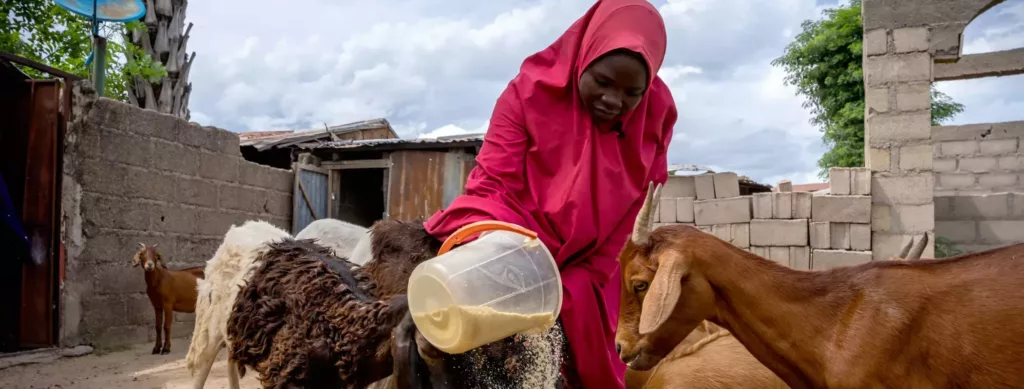
Nigeria
Nigeria is the most populous country in Africa, with more than 213 million inhabitants. Although it is oil-rich, health indicators are poor and a deepening food crisis in the country’s northeast is now one of the world’s largest humanitarian emergencies, with more than 8 million people in need of lifesaving assistance and more than 3 million displaced inside the country. Food insecurity is widespread, with more than 4 million suffering from it.
With a history in Nigeria stretching back to 2013, we are responding to emergency needs in Borno State—the epicenter of the crisis—as well as Kano State, further west, delivering programs focused on health, nutrition, food security, violence against women and girls, and water, sanitation and hygiene (WASH).

213 million
53 years
55 deaths
per 1,000 live births
Conflict, Crisis and Hunger in Northeast Nigeria
Northeast Nigeria is now the site of Africa’s largest humanitarian emergency, with more than 8 million people urgently needing lifesaving assistance. Of these, more than 4 million face food insecurity.
Learn MoreThe Challenges
Our Response
In Borno, where the Boko Haram insurgency continues to drive instability and displacement, International Medical Corps is working in the state capital, Maiduguri—as well as in three local government areas (LGAs) in the northern, central and southern parts of the state—to provide lifesaving assistance to vulnerable host-community members and families forced from their homes by violence. We also provide emergency nutrition and WASH services, as well as prevention and response services relating to violence against women and girls. And we do this in areas that have only recently become accessible to humanitarian organizations.

Nutrition and Food Security
Nigeria is home to one of the most widespread and severe food crises in the world, due to ongoing armed conflict involving organized groups (including Boko Haram) that has destroyed livelihoods, livestock and agricultural lands, and that has eroded families’ ability to feed themselves. For many, food shortages pose the threat of extreme, famine-like conditions, while hundreds of thousands of children could face life-threatening malnutrition.
International Medical Corps is providing lifesaving treatment for moderate and severe acute malnutrition for children under 5 in Borno state. Our work is supported by teams of community volunteers who go house to house to screen children for malnutrition and refer cases as needed to our nutrition outpatient treatment centers—jointly managed by International Medical Corps and State Ministry of Health staff—and stabilization center for further care.
These community volunteers also provide training for mothers and caretakers—especially pregnant and nursing mothers—about healthy infant and young-child feeding practices. Together with the UN World Food Programme (WFP), International Medical Corps is preventing malnutrition and improving household food security by distributing nutrient-dense, ready-to-use supplementary food to children under 5, well as oil and vitamin-fortified flour to pregnant and breastfeeding women. These distributions reach thousands of people in Borno state—all of whom are internally displaced.

Healthcare
International Medical Corps is working with the Borno and Kano state ministries of health to make healthcare services available to internally displaced families and vulnerable host community residents. In close collaboration with the states’ health departments, through state Primary Health Development Agency offices, International Medical Corps helps health facilities ensure that there are strong community-based surveillance and referral systems in place to respond to outbreaks of disease—including cholera, Lassa fever and COVID-19. International Medical Corps is also working to build the capacity of community-based organizations to strengthen existing local structures in both Borno and Kano.
Globally, Nigeria accounts for more than 34% of maternal mortality despite being 1% of the world’s population. One hundred seventy-two local governments in Nigeria account for 55% of MM. Borno state has 13 LGAs as high-risk.

Water, Sanitation and Hygiene
International Medical Corps is providing access to drinking water and improving hygiene and sanitation to nearly 67,000 people across three LGAs in Borno state. Our teams work in camps providing housing for internally displaced families to improve and increase access to potable WASH services, which includes rehabilitating boreholes fitted with hand pumps, restoring small water-distribution systems with solar-powered submersible pumps, chlorinating water at the source and in households, and disseminating key hygiene messages.
We also improve overall sanitation and hygiene in communities by constructing and managing latrines and showers, providing trash cans and creating drainage systems, to improve community hygiene and prevent vector-borne diseases. This infrastructure is complemented by teams of community volunteers who teach families about the importance of personal hygiene in health and how to prevent potentially deadly waterborne diseases, such as cholera.

Violence Against Women and Girls
International Medical Corps works in six LGAs of Borno state to prevent and respond to cases of violence against women and girls. Community volunteers reached more than 250,000 people in 2023 with basic information on such violence and its consequences, as well as on services available to them, including women-friendly spaces (WFS) that offer healing and empowerment for vulnerable women and survivors.
The WFS are safe environments, usually situated in centers where women and girls can socialize and make small handcrafts—such as embroidered traditional caps and beaded handbags—that they can sell to generate income for their families. Our case workers in the centers provide comprehensive one-on-one case management, offer counseling services and facilitate referrals as needed for specialized and more advanced care.
International Medical Corps also trains healthcare workers from the government and partner agencies on case management, referral pathways and available legal services to ensure that survivors receive appropriate care when referred by case workers and volunteers.


